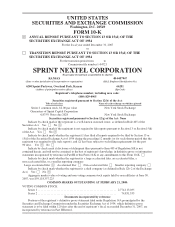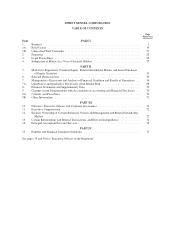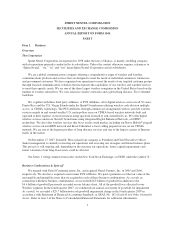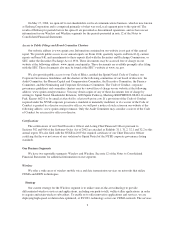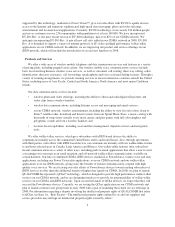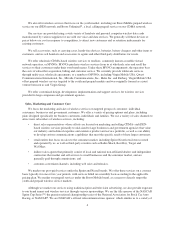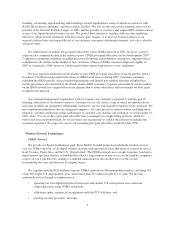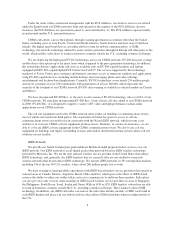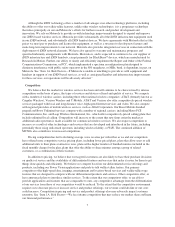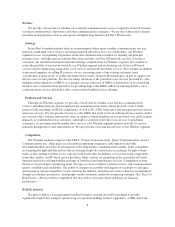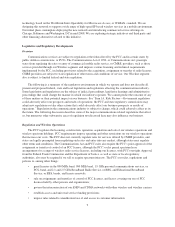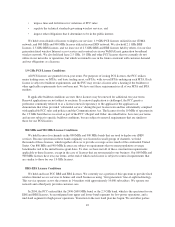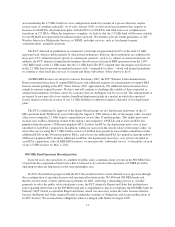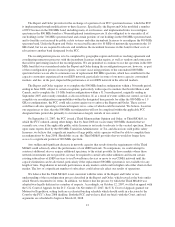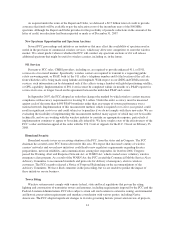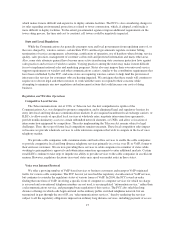Sprint - Nextel 2007 Annual Report Download - page 11
Download and view the complete annual report
Please find page 11 of the 2007 Sprint - Nextel annual report below. You can navigate through the pages in the report by either clicking on the pages listed below, or by using the keyword search tool below to find specific information within the annual report.technology based on the Worldwide Inter-Operability for Microwave Access, or WiMAX, standard. We are
designing this network to support a wide range of high-speed IP-based wireless services in a mobile environment.
Our initial plans contemplate deploying the new network and introducing commercial service offerings in
Chicago, Baltimore and Washington, DC in mid-2008. We are exploring strategic initiatives and third party and
other financing alternatives related to this initiative.
Legislative and Regulatory Developments
Overview
Communications services are subject to regulation at the federal level by the FCC and in certain states by
public utilities commissions, or PUCs. The Communications Act of 1934, or Communications Act, preempts
states from regulating the rates or entry of commercial mobile radio service, or CMRS, providers, such as those
services provided through our Wireless segment, and imposes various licensing and technical requirements
implemented by the FCC, including provisions related to the acquisition, assignment or transfer of radio licenses.
CMRS providers are subject to state regulation of other terms and conditions of service. Our Wireline segment
also is subject to limited federal and state regulation.
The following is a summary of the regulatory environment in which we operate and does not describe all
present and proposed federal, state and local legislation and regulations affecting the communications industry.
Some legislation and regulations are the subject of judicial proceedings, legislative hearings and administrative
proceedings that could change the manner in which our industry operates. We cannot predict the outcome of any
of these matters or their potential impact on our business. See “Item 1A. Risk Factors—Government regulation
could adversely affect our prospects and results of operations; the FCC and state regulatory commissions may
adopt new regulations or take other actions that could adversely affect our business prospects or results of
operations.” Regulation in the communications industry is subject to change, which could adversely affect us in
the future. The following discussion describes some of the major communications-related regulations that affect
us, but numerous other substantive areas of regulation not discussed here may also influence our business.
Regulation and Wireless Operations
The FCC regulates the licensing, construction, operation, acquisition and sale of our wireless operations and
wireless spectrum holdings. FCC requirements impose operating and other restrictions on our wireless operations
that increase our costs. The FCC does not currently regulate rates for services offered by CMRS providers, and
states are legally preempted from regulating such rates and entry into any market, although states may regulate
other terms and conditions. The Communications Act and FCC rules also require the FCC’s prior approval of the
assignment or transfer of control of an FCC license, although the FCC’s rules permit spectrum lease
arrangements for a range of wireless radio service licenses, including our licenses, with FCC oversight. Approval
from the Federal Trade Commission and the Department of Justice, as well as state or local regulatory
authorities, also may be required if we sell or acquire spectrum interests. The FCC sets rules, regulations and
policies to, among other things:
• grant licenses in the 800 MHz band, 900 MHz band, 1.9 GHz personal communications services, or
PCS, band, and 2.1 and 2.5 GHz Broadband Radio Service, or BRS, and Educational Broadband
Service, or EBS, bands, and license renewals;
• rule on assignments and transfers of control of FCC licenses, and leases covering our use of FCC
licenses held by other persons and organizations;
• govern the interconnection of our iDEN and CDMA networks with other wireless and wireline carriers;
• establish access and universal service funding provisions;
• impose rules related to unauthorized use of and access to customer information;
9

